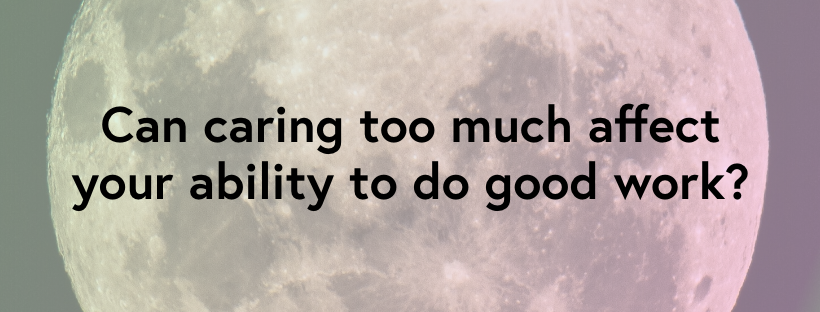Published
Last modified
This is a note. Notes are work-in-progress thoughts and ponderings that I choose to share “out loud”, subject to change and revision.
When it comes to caring in a professional setting, there are two types of care that come to mind:
- Caring about the work.
- Caring about the people.
You need both in order to be effective, unless you work solo (but even if you’re a freelancer, you have clients and collaborators, there are almost always people).
Caring about the work
People who do good work consistently typically care about their work. They want to do a good job, they think about the processes involved, and some form and level of continuous learning is a regular part of their life.
It’s possible to care too much. I’m definitely guilty of this, at times.
Sometimes we want the work to be good in a certain way, and when the people we’re working with don’t put the same amount of care into their work, that can be frustrating. It can feel like a hindrance to our own work. It can divert our attention enough that we stop doing good work ourselves. It’s not immediate, it’s typically a gradual effect, and it becomes more and more noticeable as time goes by, if we don’t take corrective action.
Everyone’s idea of good work is different. Everyone’s idea of enough work is different too. In a team environment, the standard of good or enough work will necessarily be determined by the least (good) work we accept. If, for example, we accept a new codebase addition without tests, then that becomes the baseline for what’s good and enough in our work. So if your idea of good and enough is different from that (higher or lower), then this will frustrate you when you have to deal with it.
Set standards for your own work
As cliche as it sounds, ultimately, we can only control our own actions. In a situation like this, here’s what I have started doing:
I take the baseline standards of my project or team, and I decide whether that’s acceptable to me or not. If my expectations are higher, then I explicitly set standards for myself that meet both the baseline standards and my own expectations. If my expectations are lower, then I inevitably need to adjust to meet the minimum baseline standards. However, if you’re like me, it’s likely that your expectations are higher.
Regardless of how anyone else does their work, your performance is yours, so do what you have to do to keep your performance where you want it to be. If your standards are higher than the baseline, keep them high if that’s aligned with your values and goals. Don’t let them degrade.
I’m a developer, so my work examples are going to be related to code. Here’s an example of some standards I have for how I write pull requests (PRs) for visual changes:
I will typically include a before and after screenshot. I want to make it easy for anyone reviewing my work to be able to find the change. By creating a before and after screenshot, I inevitably end up double checking my work, and comparing the differences – sometimes the mere act of doing this helps me find a mistake.
I will provide a brief description of how I created my change and even include some extra information if I discovered something funky. Sometimes this is for my own benefit – I document it in the PR and then later come back and pull it out to include somewhere properly (a project wiki for example). Other times, this provides learning benefits to my reviewer and additional context for why I might have done a certain thing in the code.
If the visual change is testable, I’ll provide a link where it can be viewed and tested, with instructions if necessary. Basically, I assume that the person reviewing my work is a newbie. Working in open source projects has drilled this into me, and while it takes a little longer and it can feel redundant, project teams change often, and the way we work should be able to handle personnel changes without too many hitches.
When other people’s work is done to a different standard
Setting standards for your own work doesn’t help you when it comes to other people’s work. My own approach here is to just accept it. I accept that other people have different standards. As long as the work meets the baseline (whether it’s implicit or explicit) standard of the project, it’s fine. If this means you have to ask more questions – ask more questions. If it means you need to take an extra couple hours to do your part, then it takes the extra couple hours.
Do what you can to empower yourself.
Keeping with the PR example, when I read PRs that are done differently than my own, I ask questions when I need to. I also take some time to understand how someone else is does their work.
I had a project teammate once who didn’t write very good PR messages and their commit messages were indecipherable. However, their work was reasonably commented, their variable names often included verbs to indicate where they’ll be used, and while their commit messages were indecipherable, there was a logical progression to the work in them.
So when I reviewed their PRs, I stepped through every commit, one by one, instead of just looking at the Files Changed tab in GitHub. If I still had questions, I asked, but by adjusting how I approached the review for them, I was able to remain fairly unblocked, make progress in good time, and then move on to something else.
I learned a lot from that particular developer, actually. Their manner of variable naming started to make sense to me and I ended up adjusting my own approach. I became more thoughtful about what I put in a single commit. I started to write commit messages that were more descriptive (as a reaction to their indecipherable commit messages).
I am a big believer in adjusting my approach to teammates and their work, to empower myself and remain unblocking for them, within reason.
Caring about the people
This is what I struggle with. So I’m going to present this from my own personal perspective. I don’t have a complete answer for this. But I have been actively working on it for the past year or so.
I have a tendency to do a lot of emotional labour, if I’m not careful. People confide in me and then I feel a responsibility to help them. This has, in the past, become a problem for me and reduced my ability to remain effective at work.
I know what it looks like when I let the interpersonal dynamics of people around me at work affect me too deeply. The consequences of that have been deep burnout and an inability to regulate my own emotions and energy. Compassion fatigue is typically seen in healthcare professions, but I identify with the symptoms strongly and have experienced them in addition to burnout before.
Someone recently gave me the advice that I should just continue in the workplace as if nothing is wrong or that I don’t know what I know. My own spouse has pointedly looked at me a number of times when I bring this up and told me I’m not responsible for bridging/resolving other people’s conflicts just because I know about them. He’s right, it’s not my responsibility, unless it directly impacts me in some way.
How can I be empathetic but not too empathetic? How can I be a positive influence and someone people can lean on, without letting it bog me down or impact my ability to continue being a positive influence and an effective teammate? What do those boundaries look like? Were the path of moderation so easy to define and tread, it wouldn’t need to be preached about in sermons and religious texts.
So here’s what I’m trying now. I’m reminding myself that I’m responsible for two things:
- The energy I bring into a setting.
- The relationship I have with a given person.
I’m not responsible for other people’s relationships with each other. I can and will listen and empathize, but it’s not my responsibility to fix anything. Basically, it’s the same advice I give myself and others when it comes to caring about the work: ultimately, we can only control our own actions, and in this case, how we show up in our direct relationships.
That’s all I have on the topic right now.

